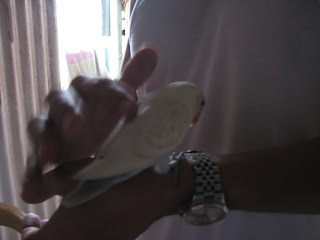There are many varieties of lovebirds, the most common being the peachfaced lovebird. A lovebird is a source of pure joy and laughter. Whenever you are in a dark mood, watch your lovebird's antics and you can see blues fading away into the distance! Lovebirds are playful by nature and it loves to follow you around on your shoulder. It plays hide-and-seek with you in your hair! Isn't that the cutest thing you have ever heard?
A lovebird is intelligent and affectionate. It can be trained to give kisses and learn other tricks. It has the ability to learn to talk and whistle. Its speech is clear and distinct. It responds eagerly to your voice and expects a loving gesture as a reward. Don't break its heart. Give it whenever it asks for it. And do not underestimate its abilities by its size. It is small in size but it is a big parrot by temperament.
1. Train A Lovebird: A lovebird training can teach your bird to talk, perform tricks, and perch on your hand, shoulder or head. Lovebirds are loving and social creatures, so make sure of training lovebirds well.
2. Peachface Lovebirds: Peachface lovebirds are the most popular variety of lovebirds. This parrot species also comes in colors like Dutch-Blue, Cinnamon, Lutino and Pied. The Peachface lovebirds are very intelligent and they are very active by nature.
3. African Lovebirds: As is evident from the name, African lovebirds are originally from Madagascar and Africa. Nine different species of African love birds are known to exist. These parrots are small but simply gorgeous.
4. Lovebird Care: Lovebirds remain lovely only when lovebird care is foolproof. Lovebird care means, first and foremost, a regular checkup of their plumage. There is nothing like sweet home. So, selecting the right cage for your lovebirds is an important part of lovebird care.
5. Pet Lovebird: The pet lovebird can be trained to talk and perform amazing tricks. However, it is not easy to train pet lovebirds. They are intelligent, graceful and often moody birds. Pet lovebirds provide a lot of entertainment and they bond with humans just as they would with their flock.



1 comments:
Can these birds be trained? How much did you get for these?
Post a Comment